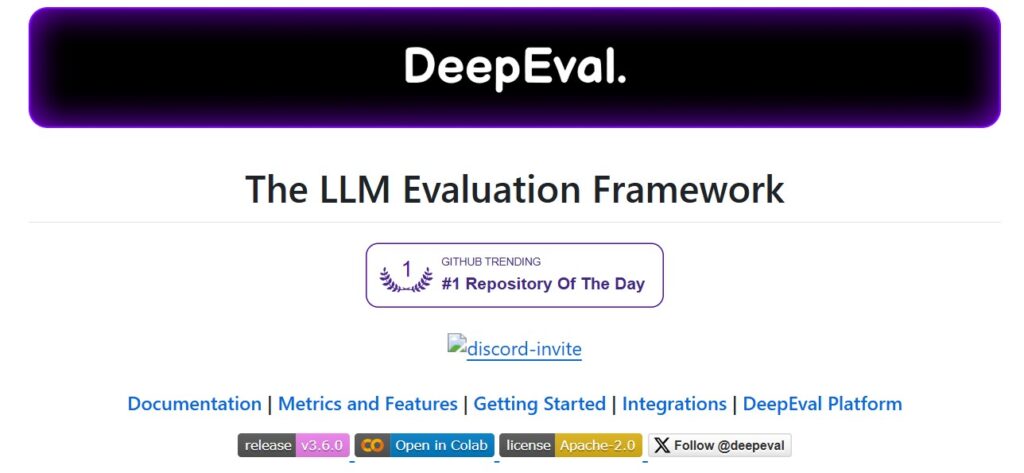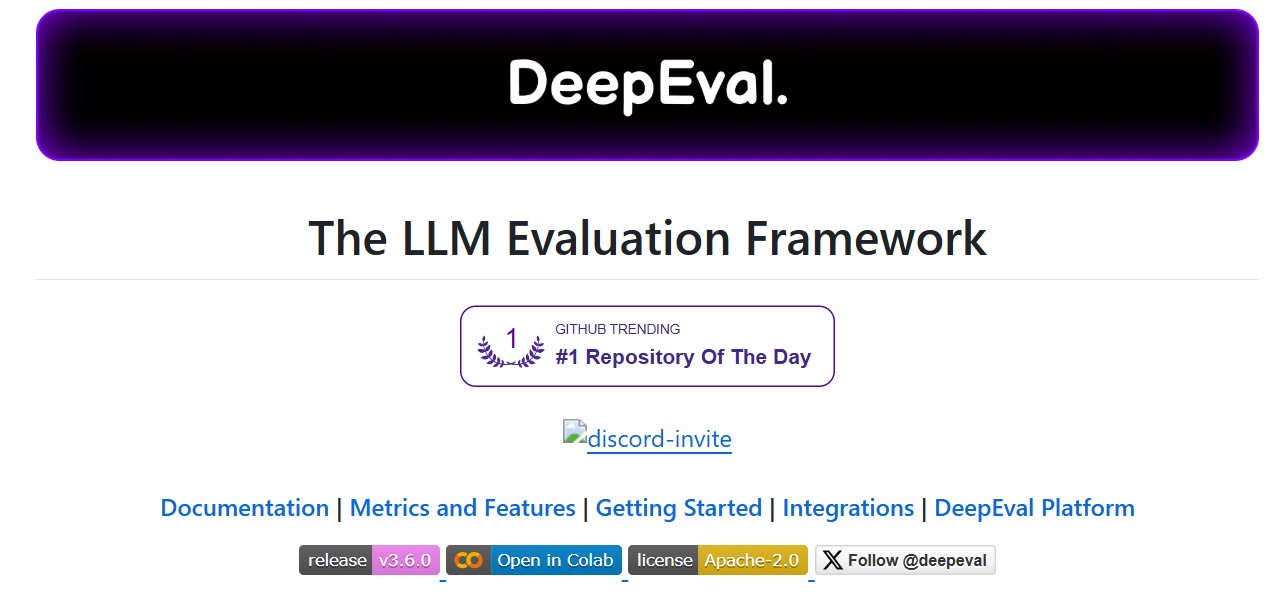In today’s AI-driven world, large language models (LLMs) have become central to modern applications from chatbots to intelligent AI agents. However, ensuring the accuracy, reliability and safety of these models is a significant challenge. Even small errors, biases or hallucinations can result in misleading information, frustrated users or business setbacks. This is where DeepEval, an open-source LLM evaluation framework by Confident AI plays a critical role.

It provides developers with a comprehensive, easy-to-use toolkit to evaluate, benchmark and fine-tune LLM applications. Whether you are building RAG (retrieval-augmented generation) pipelines, agentic workflows or customer support chatbots, it enables you to maintain high standards of performance, accuracy and safety. In this blog, we’ll explore how DeepEval works, its features, integrations and why it is an essential tool for AI developers.
What is DeepEval?
DeepEval is a specialized framework for evaluating LLM outputs. Unlike traditional unit testing frameworks, it is tailored specifically for LLMs, making it easier to test AI responses against defined benchmarks. It incorporates advanced research-based metrics such as G-Eval, RAG metrics, RAGAS, hallucination detection, and answer relevancy, allowing developers to validate both correctness and context of AI-generated content.
It works locally on your machine and can integrate seamlessly with LangChain, LlamaIndex and other AI development tools making it versatile for a wide range of LLM applications. Whether you want to optimize prompts, test pipelines or switch from cloud-based APIs to self-hosted LLMs, it provides the confidence developers need.
Key Features
DeepEval stands out because it combines simplicity with powerful evaluation capabilities. Here are some of its top features:
1. End-to-End and Component-Level Evaluation
It supports full application testing as well as component-level evaluations, allowing you to trace and evaluate individual parts of your LLM application such as LLM calls, retrievers, agents or tool integrations. This granularity ensures that every component performs optimally.
2. Advanced Evaluation Metrics
It includes a wide variety of ready-to-use metrics, including:
- G-Eval – Evaluate correctness and alignment of LLM outputs.
- RAG Metrics – Answer relevancy, faithfulness, contextual precision, recall and relevancy for retrieval-augmented generation pipelines.
- Agentic Metrics – Task completion, tool correctness and workflow efficiency.
- Others – Hallucination detection, summarization quality, bias, toxicity and conversational metrics like knowledge retention and role adherence.
Developers can also create custom metrics that integrate seamlessly into DeepEval’s ecosystem.
3. Bulk Dataset Evaluation
Testing multiple scenarios is simple with DeepEval. Developers can evaluate datasets in bulk, making it easy to benchmark AI models across hundreds of inputs ensuring accuracy and performance at scale.
4. Red-Teaming for Safety
It allows you to perform red-teaming on LLM applications, identifying vulnerabilities like toxicity, bias and SQL injection. Using advanced attack strategies such as prompt injections, developers can detect and fix potential threats before deployment.
5. CI/CD and Real-Time Integrations
It integrates with any CI/CD pipeline, allowing real-time evaluation during fine-tuning or deployment. It also supports platforms like Hugging Face and LlamaIndex enabling live evaluation of LLM models in development or production environments.
How DeepEval Works ?
Using DeepEval is straightforward and developer-friendly. Here’s a step-by-step overview:
1. Installation
DeepEval requires Python 3.9+ and can be installed using pip:
pip install -U deepeval
2. Creating a Test Case
Developers can create test cases to evaluate the AI’s responses against expected outputs. For example:
from deepeval import assert_test
from deepeval.metrics import GEval
from deepeval.test_case import LLMTestCase, LLMTestCaseParams
correctness_metric = GEval(
name="Correctness",
criteria="Check if the actual output matches the expected output.",
evaluation_params=[LLMTestCaseParams.ACTUAL_OUTPUT, LLMTestCaseParams.EXPECTED_OUTPUT],
threshold=0.5
)
test_case = LLMTestCase(
input="What if these shoes don't fit?",
actual_output="You have 30 days to get a full refund at no extra cost.",
expected_output="We offer a 30-day full refund at no extra costs."
)
assert_test(test_case, [correctness_metric])
This test ensures that your chatbot or AI agent provides accurate and expected responses.
3. Component-Level Evaluation
DeepEval allows you to evaluate specific components using the @observe decorator, so you can trace outputs from LLM calls, retrieval tools or agentic workflows without rewriting code.
from deepeval.tracing import observe, update_current_span
@observe(metrics=[correctness_metric])
def inner_component():
update_current_span(test_case=LLMTestCase(input="...", actual_output="..."))
return
This provides detailed insights into which part of your system may need improvement.
4. Cloud-Based Evaluation with Confident AI
DeepEval integrates fully with Confident AI, its cloud platform, allowing developers to:
- Curate and annotate datasets online
- Benchmark models and compare iterations
- Fine-tune metrics for custom results
- Monitor AI performance in production
- Generate sharable testing reports
Why DeepEval is a Game-Changer ?
DeepEval addresses several pain points in LLM development:
- Ensures Accuracy – Detects hallucinations and irrelevant outputs.
- Enhances Reliability – Allows component-level evaluation to prevent unexpected errors.
- Improves Safety – Red-teaming helps mitigate risks like bias or malicious prompts.
- Speeds Up Development – Integration with CI/CD pipelines accelerates testing cycles.
- Supports Customization – Developers can create tailored metrics to suit unique workflows.
By using DeepEval, AI developers can confidently deploy LLMs that are safe, reliable and aligned with user expectations.
Conclusion
As AI continues to transform industries, evaluating and ensuring the quality of LLMs is more critical than ever. DeepEval by Confident AI provides a robust, open-source framework for testing, benchmarking and fine-tuning LLM applications. Its versatile metrics, bulk evaluation capabilities, component-level tracing and cloud integration make it an indispensable tool for AI developers.
Whether you’re building RAG pipelines, chatbots, or agentic workflows, DeepEval ensures your AI models remain accurate, safe and high-performing. By adopting DeepEval, organizations can reduce errors, prevent hallucinations and deliver better user experiences with confidence.
Start using DeepEval today and take your LLM applications to the next level. Visit the DeepEval GitHub repository to explore the documentation, download the framework and join the growing community of AI developers.
Follow us for cutting-edge updates in AI & explore the world of LLMs, deep learning, NLP and AI agents with us.
Related Reads
- Paper2Agent: Revolutionizing Research Papers into Powerful Interactive AI Agents
- Cognee: Powerful Memory for AI Agents in Just 6 Lines of Code
- Join the 5-Day AI Agents Intensive Course with Google
- Docling: Simplifying Document Parsing and AI-Ready Data Processing
- Powerful Microsoft Agent Framework: Build, Orchestrate and Deploy AI Agents with Python and .NET


4 thoughts on “DeepEval: The Ultimate LLM Evaluation Framework for AI Developers”